|
|
|
Sort Order |
|
|
|
Items / Page
|
|
|
|
|
|
|
| Srl | Item |
| 1 |
ID:
177749
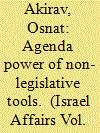

|
|
|
|
|
| Summary/Abstract |
How do we assess the power of governments to control and set the agenda in parliaments? How do we assess the power of oppositions to present their agenda? Cox and McCubbins’ cartel model used a roll rate analysis of legislation, while Krehbiel suggested the use of non-legislative tools. Based on this advice, this article investigates the use of a non-legislative tool – motions for the agenda – in the Israeli Knesset, or more specifically: ‘the agenda power of non-legislative tools’ defined as the ability to block or significantly delay motions from reaching a debate in committee. Using data from the Knesset, in which the opposition operates in a parliamentary system with multiparty coalition governments, it demonstrates that opposition legislators utilise these non-legislative tools more extensively than coalition members to wield their agenda power. The findings support the addition of this tool to the cartel model.
|
|
|
|
|
|
|
|
|
|
|
|
|
|
|
|
| 2 |
ID:
182619


|
|
|
|
|
| Summary/Abstract |
A theoretical gap in the audience cost theory is the missing analysis of its central feature: the audience. This article defines the audience as a group composed of individuals and societal actors that can punish a government and pay attention to the issue being negotiated. Thus, the audience can vary depending on the issue salience. When the issue salience is low, the audience comprises just interest groups and the attentive public. Yet, the higher the issue salience, the more voters of the general public also become part of the audience. The audience’s composition in turn determines the level of the audience costs. Because the general public tends to evaluate national honor more highly, be less informed and have less well-defined preferences than interest groups and the attentive public, the audience costs should be higher when the issue salience is high. Furthermore, the audience can take actions that prevent the effect of audience costs or generate exogenous audience costs.
|
|
|
|
|
|
|
|
|
|
|
|
|
|
|
|
| 3 |
ID:
180648
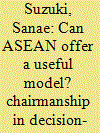

|
|
|
|
|
| Summary/Abstract |
ASEAN has adopted decision-making by consensus. Taking ASEAN as a case study, this article aims to explain how competing positions are reconciled and international agreements reached in organisations that have adopted consensus, a process that risks non-agreement because each participant has veto power, as their sole decision-making rule. ASEAN roundtables with the foreign ministers of its member states have indeed generated some meaningful agreements. I argue that rules and customs associated with ASEAN chairmanship effectively comprise a reconciliation mechanism. The chair is empowered to play an agenda-setting role, and the combination of rotating chairmanship and a limited number of member states means that every state will enjoy the strong power, within a reasonably short period of time. Since each state knows that its turn will come soon, all are willing to allow the others to exert the power of the chair and guide consensus toward agreements that are consistent with the chair’s national interests. This article analyses the impact of a strong ASEAN chair via empirical case studies of decisions reached (or not) under consensus regarding issues where member states had conflicting interests. This analysis of ASEAN decision-making contributes to the ongoing debate on effectiveness of ASEAN and has theoretical implications for the understanding of international organisations that operate under similar institutional settings.
|
|
|
|
|
|
|
|
|
|
|
|
|
|
|
|
| 4 |
ID:
077056
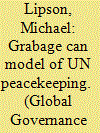

|
|
|
| 5 |
ID:
155591
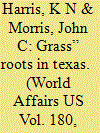

|
|
|
|
|
| Summary/Abstract |
Several scholars have pointed to a gap between the social movement and policy literatures, and argue that the failure of each field to incorporate the other creates a missing link in our understanding of how social movements and policy shape each other. This study provides an opportunity to make these links by applying John Kingdon’s multiple streams framework of agenda setting to the marijuana movement in Texas. Texas, an unlikely candidate for marijuana reform, was the site of sustained efforts to change marijuana laws during the 2015 legislative session. This research offers evidence about the ways in which social movements influence the policy process, and how the policy process responds to activist efforts. We find that despite well-organized movement efforts, political influence was limited. We argue that the reform movement’s inability to control activist participation presents additional challenges in a nonballot initiative state such as Texas.
|
|
|
|
|
|
|
|
|
|
|
|
|
|
|
|
| 6 |
ID:
152333
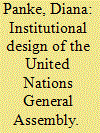

|
|
|
|
|
| Summary/Abstract |
Most international organizations are based on the principle of equality of states. Their institutional design grants all member states the same formal rights. Although formally equal, states differ immensely concerning their power capacities and size. Can institutional designs of international organizations mitigate real-world power- and size-related differences between member states, and if so, to which extent? To provide an answer, this article focuses on the United Nations General Assembly, which combines an equalizing institutional design with a large very heterogeneous membership. It shows that the strength of the equalizing effect varies across stages of the policy cycle. It is the weakest in the negotiation stage and the strongest in the final decision-making stage, while institutional design of international organizations has a de facto equalizing effect of medium strength in the agenda setting stage. Thus, while power and capacity differences matter, larger powerful states are not systematically better off throughout the entire policy cycle.
|
|
|
|
|
|
|
|
|
|
|
|
|
|
|
|
| 7 |
ID:
156235
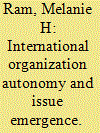

|
|
|
|
|
| Summary/Abstract |
How do international organizations (IOs) decide to address new issues? Most IO literature focuses on why states delegate to IOs and if, when, and how IOs are able to act autonomously. Less attention is paid to how IOs may use their autonomy to bring attention to new issues. This article theorizes about IO issue emergence using a qualitative case study of the advent of the World Bank's Roma inclusion agenda. By examining a case of issue emergence that appears to diverge from state demands, we can better understand how IOs exercise their autonomy and consequently shape global policy agendas.
|
|
|
|
|
|
|
|
|
|
|
|
|
|
|
|
| 8 |
ID:
167462
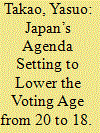

|
|
|
|
|
| Summary/Abstract |
What age a state designates as appropriate for voting rights raises a range of democratic and empirical issues. The lowering of the voting age in Japan in 2015 was the biggest expansion of the country’s democratic franchise since 1945, yet it happened in an abrupt manner. Lowering the voting age was not a significant issue among the Japanese public until the mid-2000s and the government began supporting the move officially only in 2014. Why then? What happened to precipitate this decision? This study argues that the circumstances governing the period before the policy decision was made are crucial to understanding what followed. In the prevailing theories of policy change, analysis has focused much more on the phase of decision making over policy; public opinion, policy beliefs, and policy transfer have been prominently cited as the major reasons for lowering the voting age in other countries. In contrast, this article claims that the policy opportunity spillover, from constitutional revision to voting age, was a necessary condition for lowering the age. The discussion of constitutional revision incidentally opened a policy window to another issue area, in this case voting age. The findings help us answer the question of what time period we need to examine in order to discern actual policy dynamics.
|
|
|
|
|
|
|
|
|
|
|
|
|
|
|
|
| 9 |
ID:
152453
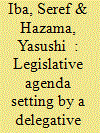

|
|
|
|
|
| Summary/Abstract |
This article examines the political motives and legislative consequences of Turkish omnibus bills that propose to amend a large number of disparate, unrelated laws. The quantitative analysis reveals, first, that the government uses omnibus bills to covertly change existing laws by attaching new articles to bills that are being deliberated. Second, undercover legislation backfires. The larger the number of current laws changed by an omnibus bill, the more likely those changes are to be annulled by the Constitutional Court. The legislative-efficiency objective behind omnibus bills is thus undermined by legal errors and deficiencies that result from a lack of parliamentary discussion.
|
|
|
|
|
|
|
|
|
|
|
|
|
|
|
|
| 10 |
ID:
120143
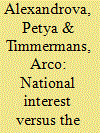

|
|
|
|
|
| Publication |
2013.
|
| Summary/Abstract |
The European Council is an institution which brings together the Heads of State, or Governments of the European Union (EU) Member States. For the Presidency, preparing the agenda of European Council meetings involves a tension between loyalties. Existing research is divided over the question whether the Presidency pushes its domestic policy agenda on the EU level. Using empirical data on the Conclusions of European Council meetings, and national executive speeches presented annually in five Member States, this article investigates the relationship between the policy agendas of the EU and its constituent countries. It tests whether national issue attention of the Presidency holder dominates the European Council agenda. The findings suggest that having the Presidency does not provide a de facto institutional advantage for agenda setting power for any of the countries in the sample. The analysis points out that normative and political constrains limit the leeway of presiding Member States to push for domestic agenda preferences in the European Council.
|
|
|
|
|
|
|
|
|
|
|
|
|
|
|
|
| 11 |
ID:
145489
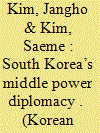

|
|
|
|
|
| Summary/Abstract |
This paper suggests that South Korea’s middle power identity can take on a more distinctive shape, and fulfill concrete goals, if it adopts a model of agenda-partner based leadership in which it demonstrates agenda-setting capabilities in tandem with strategic partner selection. Its middle power initiatives have been one way for South Korea to promote its national interests amidst a volatile geopolitical environment. However, its present middle power track has often lacked direction and sophistication. This is largely due to poor agenda selection, oftentimes choosing agendas that are too broad in scope or too rigid to coordinate with potential partners. Refining South Korea’s middle power diplomacy by directing resources to specific agendas, and collaborating with selective partners, will not only enable South Korea to secure a niche among myriad agendas, but also make it possible to build strategic, as opposed to tactical, coalitions.
|
|
|
|
|
|
|
|
|
|
|
|
|
|
|
|
| 12 |
ID:
192607


|
|
|
|
|
| Summary/Abstract |
This article retraces and reconstructs the process of developing and launching the European Union’s Military Mobility project. Situated in the agenda-setting and policy-transfer literature, this article explicates the establishment and implementation of the Military Mobility project and helps to explain the entire policy and development process around the Military Mobility initiative to date. By drawing on process tracing, this article methodologically unpacks the process surrounding this policy development at the EU level. The results show that the European Commission has expanded its competences within the defence field by purposefully and politically acting upon the worsened security situation in and around Europe, while actively building coalitions and managing good working relations with the actors involved in the project. Moreover, the findings show that the EU services have learned from NATO in the defence domain. Thus, this analysis contributes to a greater understanding of the new role of the European Commission in the field of EU security and defence policy.
|
|
|
|
|
|
|
|
|
|
|
|
|
|
|
|
| 13 |
ID:
092259
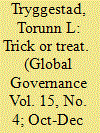

|
|
|
|
|
| Publication |
2009.
|
| Summary/Abstract |
The adoption in October 2000 of UN Security Council Resolution 1325 on Women, Peace and Security is regarded as a groundbreaking achievement in putting women's rights on the peace and security agenda of the UN. Critics have suggested that the adoption of this resolution has made little difference in terms of changed policies and practices. I argue, however, that it has nevertheless made a difference. The adoption of Resolution 1325 is the expression of a new norm in the making. Furthermore, it illustrates how cross-cutting thematic issues such as "women, peace, and security" today are placed on the agenda and nurtured by the UN Secretariat in close cooperation not only with member states, but, just as important, with networks of nongovernmental organizations and individual experts
|
|
|
|
|
|
|
|
|
|
|
|
|
|
|
|
| 14 |
ID:
166454
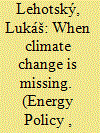

|
|
|
|
|
| Summary/Abstract |
One of the EU's main decarbonization goals is a reduction in the energy use of coal. It would be a mistake, however, to assume that public support for decarbonization can be gained automatically by pointing out threats from climate change, particularly in light of the role coal plays in the local and national economy and in energy security. In this article we search for factors affecting public support for a coal phase-out in media content. According to the theory of agenda setting, the media establishes problems calling for solutions and influences public perceptions of the (un)importance of those problems. We illustrate this case on the example of the Czech Republic. The paper demonstrates that Czech media has cultivated a discursive environment in which coal mining is separated from coal combustion, neglecting the inevitable interconnection of these two processes; coal consumption is not characterized as an environmental problem; and the economic problems of private companies more easily become public problems, making future coal phase-out policies harder to implement.
|
|
|
|
|
|
|
|
|
|
|
|
|
|
|
|
|
|
|
|
|